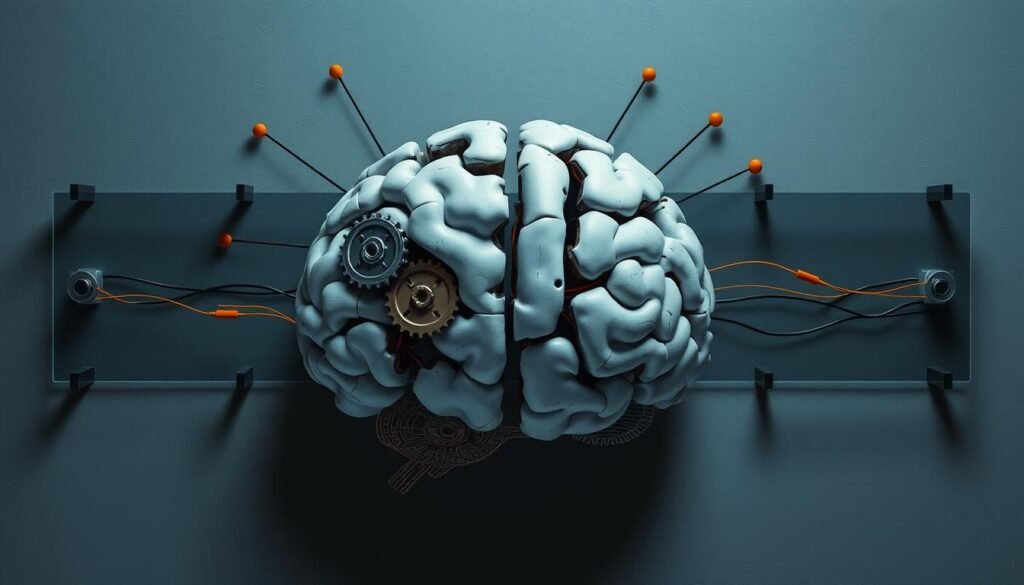Introducing AI Research Question Generator Now: Pros and Cons
November 6, 2024 | by Jean Twizeyimana

Welcome as we introduce the innovative ai research question generator. Artificial intelligence (AI) like ChatGPT is now a big topic in academic research. It can save researchers time by making accurate and well-structured text. It also helps with formatting citations. But, there are worries about AI’s accuracy, originality, and who owns the ideas.
I’ve been looking into how AI tools like ChatGPT help with research questions. These systems can quickly come up with many questions. But, it’s key to check if these questions are good and fit the research goals.
Key Takeaways
- AI can save time and effort in generating research questions, but the quality and relevance must be carefully evaluated.
- Concerns exist around the accuracy, originality, and authorship of AI-generated research questions.
- Clear policies and best practices are needed to ensure the responsible use of AI in academic research.
- AI should be viewed as a tool to assist researchers, not replace human expertise and decision-making.
- The integration of AI in research must be done in a way that maintains scientific integrity and transparency.
Introduction to AI-Powered Research Question Generation
Artificial intelligence (AI) is changing many fields, including science. It uses natural language processing (NLP) to understand and create human language. Models like ChatGPT, from OpenAI, could change how we do research by helping with questions.
Background on AI and Natural Language Processing
These AI models can look at lots of research, find gaps, and suggest new directions. They use NLP to find important points and ask questions humans might miss.
The Role of AI in Formulating Research Questions
AI can make a big difference in research. It can help in many ways, like:
- Summarizing research and finding gaps
- Coming up with first research questions
- Starting points for exploring ideas
- Making research questions more creative
By using natural language processing, AI language models, and research frameworks, researchers can make their work better. This could lead to more important and innovative studies.
“AI can revolutionize the way we approach scientific research by assisting in the formulation of research questions that are more insightful, innovative, and likely to yield meaningful results.”
Advantages of Using AI for Research Question Generation
Using AI tools like ChatGPT can greatly help researchers. They save a lot of time and work more efficiently. AI can quickly look through lots of research, find patterns, and suggest new directions. This makes the research process faster and more focused.
Studies show AI can cut literature review time by up to 50%. This means researchers have more time for other important tasks. AI’s accuracy and predictive skills also help improve research results and guide to stronger conclusions. AI’s questions can spark new ideas for human researchers, speeding up the research journey.
“AI algorithms are revolutionizing the way we approach research, allowing us to uncover insights and formulate questions that would have been nearly impossible through manual methods alone.”
AI in research question generation boosts productivity and opens new collaboration doors. It automates data sorting, letting researchers dive into creative and conceptual work. This drives progress in their fields.
As AI grows, its benefits for research will grow too. By using AI, researchers can achieve more efficiency, productivity, and insights. This propels their work and advances human knowledge.
Potential Drawbacks and Limitations
AI-powered research question generation has many benefits. Yet, it also has drawbacks and limitations. One major concern is the quality and accuracy of the questions it generates. AI models, like ChatGPT, are only as good as the data they learn from. There’s a risk of bias or inaccuracies in the research process.
Quality Concerns and Risk of Inaccuracies
Researchers should be careful when using AI-generated questions. They need to check if these questions are of high quality, relevant, and meet the research goals. There’s also a worry about AI’s ability to come up with new ideas. It might just mix up old ideas instead of creating something new.
Recently, over half a dozen lawsuits have been filed against AI text and image generation tool makers. This shows legal issues in the field. Generative AI tools can also be shut down suddenly, disrupting users. Users might face legal trouble if AI tools create copyrighted content or spread false information.
A federal court ruled that AI-generated content can’t be copyrighted. This makes things tricky for users. AI tools struggle to tell reliable info from false information, which can harm their reputation. Image generators often spread racist stereotypes and misinformation, affecting users’ choices.
Another issue is “AI drift,” where AI tools’ accuracy drops over time. This has been seen in text generators’ math skills. Out of three insight generators tested, two were not ready for handling user data.
In summary, AI-powered research question generation is promising but comes with challenges. These include quality issues, legal problems, and the lack of understanding in AI insights. Researchers need to be aware of these limitations.

AI Research Question Generator
Advanced natural language processing (NLP) tools like ChatGPT have changed how researchers ask questions. These AI systems, trained on huge amounts of data, can find gaps in research and suggest new questions. They help create studies that could make a big difference.
ChatGPT is especially useful for coming up with research questions. It can understand what you mean and give answers that seem like they were written by a person. But, researchers need to be careful and think critically when using ChatGPT. This ensures the questions it comes up with are good and fit what the researcher wants to study.
| AI-Powered Tool | Capabilities |
|---|---|
| SaaS Ideas Generator | Generates innovative business ideas and concepts for Software-as-a-Service (SaaS) products |
| AI Vision Statement Generator | Crafts concise and impactful vision statements to guide an organization’s strategic direction |
| LinkedIn Job Description Generator | Assists in creating compelling job postings to attract top talent on the professional networking platform |
There are many AI tools out there to help with different tasks, like making images and videos, or even music. These ChatGPT and GPT language models are changing how we work. They open up new ways for researchers and professionals to do their jobs.
“The future of research lies in the seamless integration of human expertise and AI-driven insights. By leveraging the capabilities of advanced natural language processing tools, we can unlock new frontiers of discovery and push the boundaries of what’s possible.”
Best Practices for Utilizing AI in Research
Using ethical AI practices in research is becoming more common. It’s key to use AI wisely and with care. Researchers need to check AI tools like ChatGPT for quality and accuracy. They should make sure the questions fit their research goals and don’t have biases.
It’s also important to be open about using AI in research. Clear rules for human-AI collaboration and who gets credit are vital. Keeping up with AI’s latest developments helps researchers use it wisely.
Responsible AI Usage and Human Oversight
To use AI responsibly in research, follow these steps:
- Check the quality and accuracy of AI questions before using them.
- Be clear about using AI tools in your research.
- Make sure who contributed to the research is properly credited.
- Keep learning about AI’s latest features and limits.
By doing these things, researchers can use AI well. This keeps their work trustworthy and follows the highest standards of human-AI collaboration and research integrity.
“Responsible use of AI in research is crucial for ensuring the reliability and credibility of our findings. By exercising human oversight and maintaining transparency, we can unlock the full potential of this technology while preserving the integrity of the scientific process.”
Impact on Academic Integrity and Authorship
The use of AI tools like ChatGPT in research raises big questions about fairness and who should get credit. People worry that AI text could be used in ways that don’t give enough credit to human researchers.
Researchers and schools are trying to figure out what AI’s role should be in research. They’re looking at how to give AI the right credit and deal with issues of ownership and plagiarism.
- A study by Wagner, Lukyanenko, and Pare (2021) found that AI contributions in literature reviews need human insight for new ideas.
- Zulhusni says AI like ChatGPT might accidentally copy style and content, causing plagiarism worries and making it hard to define academic integrity.
- OpenAI admits ChatGPT has biases and suggests checking and fixing its content.
As more research uses AI-generated text, journals, publishers, and schools will have to make clear rules. They need to keep research trustworthy and fair.
“AI’s lack of originality, creativity, and insight poses a threat to lack of correctness in scholarly publishing,” says Fabienne Michaud, a speaker at a PubCon event.
Using AI in research is a tricky issue that needs careful thought. It’s a challenge to keep research values strong while using new technology.

Applications in Specific Research Domains
AI in Medical Research and Education
AI-powered research question generation is making waves in specific areas like medical research and education. In AI in medical research, these tools help analyze huge amounts of clinical data. They spot patterns and trends, and suggest research questions that could improve diagnosis, treatment, and patient care.
In AI in medical education, AI-generated content can enhance traditional teaching methods. It offers personalized learning and helps spread research findings to healthcare pros. Using AI in medicine needs careful thought about ethics and keeping human oversight to ensure results are reliable and trustworthy.
AI tools in data analysis in research make medical research more efficient and lead to new discoveries. They automate tasks like data collection and analysis. This lets researchers focus on deeper analysis and interpretation, speeding up the research process.
| AI Application | Benefits in Medical Research and Education |
|---|---|
| AI-powered data analysis | – Identifies patterns and trends in vast clinical datasets – Supports hypothesis generation and experimental design – Accelerates the research process by automating data-intensive tasks |
| AI-generated educational content | – Provides personalized learning experiences for medical students – Facilitates the dissemination of research findings to healthcare professionals – Enhances the efficiency of medical education and training |
While AI in medical research and education is promising, it also brings up big ethical questions. It’s vital to keep human oversight, protect data privacy, and tackle algorithmic biases. This ensures AI is used responsibly and in a trustworthy way.
Future Directions and Ethical Considerations
AI in research is growing fast, and we must think about its future and ethics. Researchers, policymakers, and others need to talk and work together. They must tackle issues like bias, transparency, and data use responsibly.
Creating clear rules for AI in research is key. This ensures research stays trustworthy and true to its values. As AI gets better, we must balance its benefits with ethical and scientific standards.
Ethical issues with AI in research include:
- Bias and Fairness: AI should not spread or increase biases. It should help create diverse and inclusive research questions.
- Transparency and Explainability: We need to understand how AI suggests research questions. This builds trust and accountability.
- Data Privacy and Security: Protecting people’s privacy and using data wisely is vital in AI research.
- Human Oversight and Agency: Humans should still make key decisions in research. AI should assist, not replace, researchers.
As AI’s role in research grows, teamwork and AI regulation are essential. They help solve AI ethics problems. This way, AI can make research better, not worse.
Conclusion
AI tools like Ahrefs’ Conclusion Generator bring both good and bad to research. They can make research faster and suggest new ideas. But, they also raise worries about quality, originality, and fairness in research.
As AI in research grows, it’s key for everyone to work together. We need to create rules and guidelines for using AI wisely. This way, we can use AI to improve research while keeping it honest and true to science.
The future of AI in research looks bright. It could make research easier, find new discoveries, and expand our knowledge. But, we must use AI carefully. We need to make sure it fits with the values of honest and reliable research.
FAQ
What are the advantages of using AI for research question generation?
What are the potential drawbacks and limitations of using AI for research question generation?
What is ChatGPT and how does it relate to research question generation?
What are the best practices for utilizing AI in the research question generation process?
How does the use of AI in research question generation impact academic integrity and authorship?
Source Links
- The Potential and Concerns of Using AI in Scientific Research: ChatGPT Performance Evaluation
- Pros and Cons of AI-Generated Content | TechTarget
- AI Research Question Generator [100% Free, No Login Required]
- AI Powered Questions Generator | Toolsaday
- Guides: Artificial Intelligence (Generative) Resources: AI Tools for Research
- Research Question Generator AI Free | Restackio
- Importance and Benefits of AI Question Generator Tools
- Can AI Do That? The Challenges, Limitations, and Opportunities of Generative AI
- AI-Powered Tools for UX Research: Issues and Limitations
- Research Question Generator | Tools for Growth | Unifire.ai
- Best Free AI Tools for Your Business, Design & Education
- Getting started with prompts for text-based Generative AI tools
- AI Research Question Prompt Generator
- Guidance on the use of AI in research – @theU
- AI writing in academic journals: Mitigating its impact on research integrity
- Science journals set new authorship guidelines for AI-generated text
- Ai Research Question Generator Free | Restackio
- Ai Research Question Generator | Restackio
- Exploring the Future: AI Research Question Generator Unveiled.
- Ethical Considerations When Using AI for Behavioral Targeting
- AI and Academics: Exploring Ethical Content Generation
- Free AI Conclusion Generator
- Research Question Generator [100% Free, No Login]
RELATED POSTS
View all



